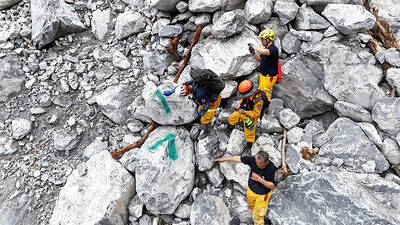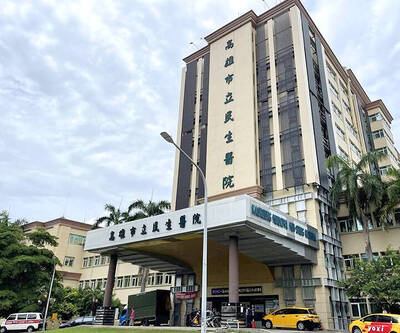ADImmune Corp obtained a loan of NT$1 billion (about US$30 million) from eight banks in Taiwan yesterday to build a vaccine manufacturing plant capable of mass-producing enough avian influenza vaccines for everyone in Taiwan.
President Ma Ying-jeou (馬英九) and Vice President Vincent Siew (蕭萬長) attended a press conference to announce the loan yesterday to show the government’s support for building “the TSMC of the biomedical field.”
“This is an important milestone in the development of Taiwan’s biomedical industry,” Ma said, adding that Taiwan needs to “get ahead of the race.”
He said his support for Steve Chan (詹啟賢), chairman and chief executive officer of ADImmune, was based on friendship as well as because Chan served as deputy executive director of Ma’s presidential campaign.
ADImmune obtained the NT$1 billion loan and will complete increasing its capital to NT$1.3 billion in the near future to finance its operations.
Combined with the NT$500 million in government investment it recently received from the Executive Yuan Development Fund, its capital injection totals NT$2.8 billion, the largest capital increase received by a Taiwanese biomedical company.
The company plans to build a manufacturing plant that will meet the standards of both the EU and US Food and Drug Administration.
ADImmune already has a Good Manufacturing Process (GMP) level manufacturing plant in central Taiwan.
Once the new plant is completed, it will be able to produce 30 million shots of avian influenza vaccine a year.
“Our first priority is the H5N1 [avian influenza] vaccine, and we have already started researching and developing new production processes for the Japanese encephalitis vaccine,” said Ho Mei-shang (何美鄉), chief managing director of ADImmune.
“A vaccine for enterovirus is on our list as well,” Ho said.
While the size of the company’s vaccine market was still difficult to determine, Chan said, “the demand will most certainly exceed supply.”

Former president Ma Ying-jeou’s (馬英九) mention of Taiwan’s official name during a meeting with Chinese President Xi Jinping (習近平) on Wednesday was likely a deliberate political play, academics said. “As I see it, it was intentional,” National Chengchi University Graduate Institute of East Asian Studies professor Wang Hsin-hsien (王信賢) said of Ma’s initial use of the “Republic of China” (ROC) to refer to the wider concept of “the Chinese nation.” Ma quickly corrected himself, and his office later described his use of the two similar-sounding yet politically distinct terms as “purely a gaffe.” Given Ma was reading from a script, the supposed slipup

The bodies of two individuals were recovered and three additional bodies were discovered on the Shakadang Trail (砂卡礑) in Taroko National Park, eight days after the devastating earthquake in Hualien County, search-and-rescue personnel said. The rescuers reported that they retrieved the bodies of a man and a girl, suspected to be the father and daughter from the Yu (游) family, 500m from the entrance of the trail on Wednesday. The rescue team added that despite the discovery of the two bodies on Friday last week, they had been unable to retrieve them until Wednesday due to the heavy equipment needed to lift

Former Czech Republic-based Taiwanese researcher Cheng Yu-chin (鄭宇欽) has been sentenced to seven years in prison on espionage-related charges, China’s Ministry of State Security announced yesterday. China said Cheng was a spy for Taiwan who “masqueraded as a professor” and that he was previously an assistant to former Cabinet secretary-general Cho Jung-tai (卓榮泰). President-elect William Lai (賴清德) on Wednesday last week announced Cho would be his premier when Lai is inaugurated next month. Today is China’s “National Security Education Day.” The Chinese ministry yesterday released a video online showing arrests over the past 10 years of people alleged to be

MIX-UP: Kaohsiung Municipal Min-Sheng Hospital director Yen Chia-chi was suspended from his duties after surgeons operated on the wrong patient last week The Kaohsiung Department of Health yesterday fined Kaohsiung Municipal Min-Sheng Hospital NT$500,0000 for misidentifying two patients and consequently causing one of them to undergo the wrong surgery last week. The hospital’s director Yen Chia-chi (顏家祺) was suspended from his duties. The surgeon who was scheduled to operate on the patient was given a major demerit and is subject to subsequent disciplinary actions. Demerits were given to the anesthesiologist, the nurse in the operation room, the nurse in the ward and the worker who helped transfer the patient from the ward to the operation room for having failed to verify the patient’s identity. Meanwhile, the